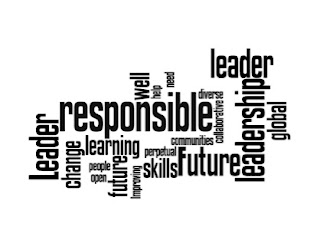Over the last few days I have been thinking about what was
said to me at a dinner I attended last week. The companion seat on my left and
I started talking about Corporate Social Responsibility, and he made a very
interesting observation. ‘It is not that companies want to be responsible, it
is more that they do not want be irresponsible.’ This started me thinking, was it
that Corporations currently do not want to be responsible due to a perceived
impact that this can have on the productivity of a business or is it because
they do not have the innovation skills to conduct business in a responsible
manner and are unaware of the benefits of being responsible, which is a pro
active approach. Where as not wanting to be irresponsible is passive approach,
taking into account important issues such as health and safety, human rights
and environmental issues, but it does not seek out innovation and new methods
to conduct business.
 My companion sat on the left who made this remark, had spent
many years in the real estate industry followed by 20 years working for a large
investment bank, doing real estate finance on both sides of the pond. So he had
a good understanding of the corporate psyche and well placed to comment on it. At the centre of his argument was that
Corporations are businesses. Their ‘raison d’etre’ is the production of goods
and services, and the generation of profits for their shareholders, who, in the
majority of cases, invest in a company for profits and long- term growth of their
capital investment. This in turn places pressure on the executives running the
corporation to run the business in the most efficient manner or risk losing
their jobs. So, this is the main priority, and within these parameters they
conduct business in the best way so that they are not ‘irresponsible’. But, if
they could conduct business in an ethical and sustainable way that would not
affect their two main obligations they would. After all the executives of companies
live in the same global environment as their customers and are equally affected,
after all they are also customers to many companies.
My companion sat on the left who made this remark, had spent
many years in the real estate industry followed by 20 years working for a large
investment bank, doing real estate finance on both sides of the pond. So he had
a good understanding of the corporate psyche and well placed to comment on it. At the centre of his argument was that
Corporations are businesses. Their ‘raison d’etre’ is the production of goods
and services, and the generation of profits for their shareholders, who, in the
majority of cases, invest in a company for profits and long- term growth of their
capital investment. This in turn places pressure on the executives running the
corporation to run the business in the most efficient manner or risk losing
their jobs. So, this is the main priority, and within these parameters they
conduct business in the best way so that they are not ‘irresponsible’. But, if
they could conduct business in an ethical and sustainable way that would not
affect their two main obligations they would. After all the executives of companies
live in the same global environment as their customers and are equally affected,
after all they are also customers to many companies.
So the questions that follows is. How do you enable a
Corporation to shift from not wanting to be irresponsible to wanting to be
responsible? The shift to not wanting to be irresponsible was driven by
external factors, the consumer, media and society at large and these will go
some way to help the drive towards wanting to be responsible. Investors are
starting to have an impact; they want to invest in companies that they feel are
acting responsibly and conducting in what I like to call ‘Sustainable
Business.’ They have the potential to
enable the shift, but currently they are in the minority.
The real game changer will come internally within the
company, which I alluded to in the introduction. Innovation in sustainability
from within will enable a business to become responsible because when it is
applied correctly sustainability has the potential to improve productivity,
increase revenues and reduce overheads, only if it is implemented properly.
Thus, not only making their products more appealing to consumer, but also
making the company more attractive to investors.
To enable this shift to responsible to take place, a company
will need to be fully open to innovation and new approaches to doing things.
They will need to have a team of in house consultants or Sustainability
Department, who have an understanding of technology, politics and economics,
operations, finance, project management and communications. This is a very
broad skill set, but for sustainability to be embedded in a company, and
particularly if it is going to be responsible sustainability, it has to cover
not only the supply chain and operations, but also how the company expands, may
that be in one country or across the globe in multiple locations. How it
communicates with stakeholders, both internally and externally and how technology
can play a part not only in communication and energy saving, but also in how to
drive down costs in the supply chain. It is an holistic approach that cannot be
completed without all parts being involved, to use a cliché “it is greater than
the sum of its parts.”


No comments:
Post a Comment